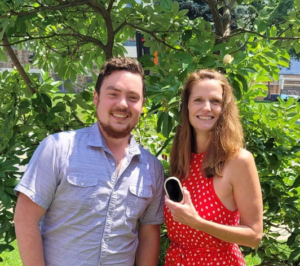Who is a member?
Our members are the local governments of Massachusetts and their elected and appointed leadership.

Kara Showers, right, Melrose’s prevention and wellness coordinator, holds one of Melrose’s Pocketalk language translation devices. Standing with her is Collin Macgowan, Melrose’s social services coordinator.
A small, handheld device is helping Melrose employees translate conversations with non-English speakers and is allowing the city to provide services more effectively to a broader range of residents.
Over the past year, the city has been piloting the use of Pocketalk, a two-way language translation device that allows city employees and local community service providers to communicate with people in 82 languages. Since the spring, Melrose has distributed more than 100 devices to city departments and local agencies. In a statement, Mayor Paul Brodeur said the devices will help improve the city’s “capacity to provide effective customer service and city services to our community members whose primary language is not English.”
Collin Macgowan, Melrose’s social services coordinator, said the city embraced the devices because it needs more help managing bilingual conversations. The multilingual capacity of city employees isn’t keeping pace with the public’s needs, he said, and traditional translation services are too expensive to afford on a municipal budget.
“We are increasingly seeing a lot more language diversity in the city of Melrose,” Macgowan said. “We needed a solution that was going to [improve] accessibility to the residents, who are deserving of services and resources, and make the provision of those services as equitable as we could.”
Macgowan said he increasingly works with residents who speak Spanish, Haitian Creole, Portuguese, Cantonese, Mandarin and Arabic. Given his role, he often assists people in especially vulnerable situations, such as those in urgent need of domestic violence resources. Language barriers were frustrating, he said, because he couldn’t build relationships as easily with the people he was trying to help.
“It wasn’t appropriate, it wasn’t fair to the person,” Macgowan said. “But having the Pocketalk gave me another option, and it helps those people to feel like City Hall was a place that they could come to receive what they needed as well.”
Macgowan and Kara Showers, Melrose’s prevention and wellness coordinator, trained city employees on the devices in May. About 30 employees have received training so far, and 15 departments have the devices on hand, including the Department of Health and Human Services, which collaborates regionally with Wakefield and Stoneham. The city has also given devices to the office of Sen. Jason Lewis and to dozens of local nonprofits and social service agencies.
Each device has two buttons: one translating the first speaker’s language into the second language, and one reversing the process, Macgowan said. The translation takes place both in audio and as text, and the text is expandable for people with vision needs. The translation becomes more accurate as the devices learn the users’ voices and accents, he said.
The Pocketalks, which cost $100 or less apiece, were purchased with a combination of funds from MelroseWakefield Hospital/Tufts Medicine/Shields MRI and the state Department of Public Health, through its Public Health Excellence Shared Services grant program.
The devices have become especially critical as Melrose, like many other communities, has experienced an influx in migrant families needing emergency services, Macgowan said. While he uses his Pocketalk two to three times in a typical week, he said he used it about a dozen times while serving a large group of immigrants who had just arrived in the community.
“The Pocketalks were a lifeline, for us to be able to speak with those families, in a way that made them feel respected, that respected their dignity, that made us able treat them like we would any other person who found themselves in our community,” Macgowan said.